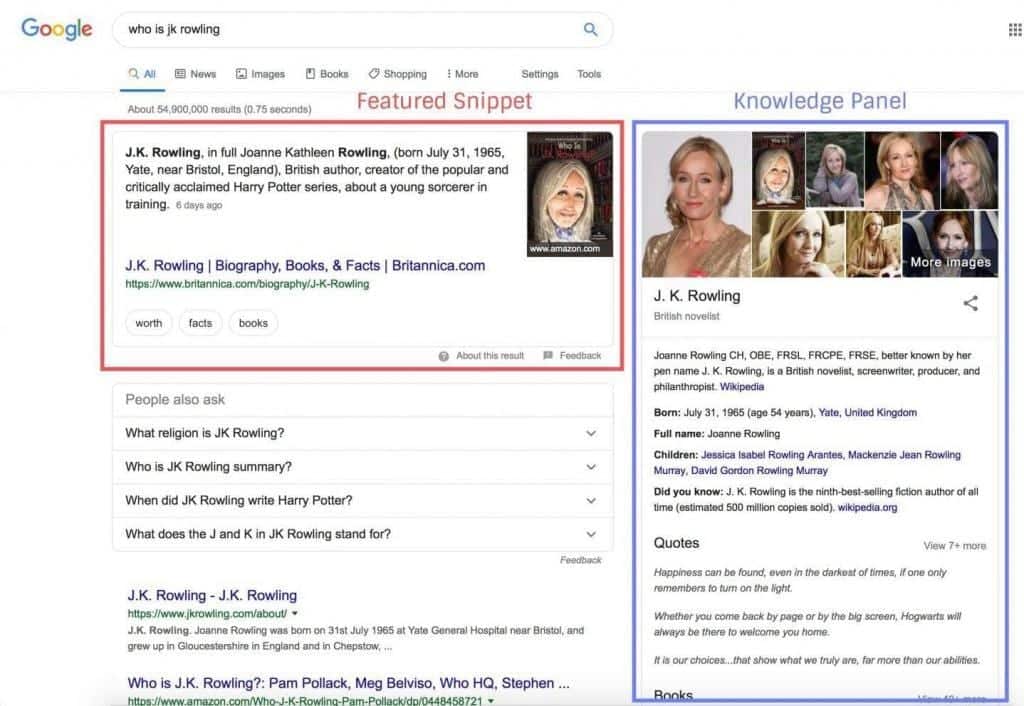Most people view Google as a sort of impartial guide to the internet, leading viewers to the websites that are most likely to answer their queries. However, unlike Jeeves, Google has a major hand in the game. After all, under the umbrella of Alphabet (Google’s parent company), you’ll find a number of valuable businesses and services: YouTube, Google Maps, Google Images, Google Cloud, Google Drive, Google Hangouts, Android, Chrome, Nest, AdSense, DoubleClick, Blogger, and on and on the list goes. And every time you search on Google, the search engine has the option of presenting an Alphabet-owned website amongst the results. Plus, as the years have gone by, Google has begun presenting more information above the search results, seeking to immediately answer users’ queries (so that they don’t have to click on any of the results). Clearly, Google is not an impartial guide, which begs the question: Is Google hogging your search traffic?

Is Google Hogging Your Search Traffic?
In July 2019, a U.S. Congressional panel asked Adam Cohen, Google’s representative and the company’s director of economic policy, “Of the total U.S. mobile and desktop searches that occur on Google Search, is it true that less than 50 percent result in clicks to non-Google websites?” Despite the clear “Yes” and “No” boxes beneath the question, awaiting Cohen’s checkmark, he decided to bypass the checkboxes completely and write a nondirect, evasive answer (source). So if you were hoping to get a definitive answer from the source, I’m afraid you’re out of luck. Instead, let’s dig into some numbers . . .
According to Jumpshot, in the first quarter of 2019, a period during which Google received over 150 billion search queries, it sent approximately 6 percent of searches to Alphabet-owned websites. It also solved approximately 49 percent of searches on the results page, i.e., the user didn’t click on any of the results (By June 2019, over half of searches were zero-click searches). Additionally, about 7 percent of search clicks went to paid results.
So how many queries resulted in the user clicking on a non-Alphabet-owned website? About 45 percent.
Just 45 percent – Sounds pretty rough, doesn’t it? It can be disheartening to realize that all of us dedicated to optimizing our websites for Google are receiving a search click on less than half of queries. With zero-click searches steadily soaring, paid search clicks rising in popularity, and Alphabet increasing its online domination, organic search clicks simply don’t receive as much attention as we might hope. However, it’s important to keep this all in perspective.
Is Google hogging your search traffic? Maybe. Yes. A bit. (It depends on your definition of “hogging.”) But that doesn’t mean SEO is now worthless.
Before we discuss why you shouldn’t despair just yet, let’s delve into the two primary ways that Google is hogging your traffic: zero-click searches and Alphabet-owned websites.
Is Google Hogging Your Search Traffic with Zero-Click Searches?
Google’s self-purported goal is to help users find what they’re looking for online by quickly locating the most relevant, useful results and clearly presenting them. To Google, a zero-click search is a great success: in an instant, without any further effort, the user has found an answer to their query. So over the years, Google has modified its results pages, often placing a significant amount of information above organic search results (in a place some call “position 0”) or to the side.
According to SearchEngineJournal.com, 34.4 percent of desktop searches are zero-click searches. On mobile, that number surges to 62.5 percent. Additionally, in the past three years of mobile searches, organic has fallen by nearly 20 percent, paid ads have nearly tripled, and zero-click searches are surging in popularity (source). For both desktop and mobile, the percentages of zero-click searches are expected to continue rising as well.
The following sorts of queries often lead to zero-click searches:
- Basic Data Questions: Queries that seem to rely on a database of information (and similar queries) are often answered by Google at the top of the SERP. For example: When is Labor Day? What time is it in London? What is the conversion rate for US dollars to Japanese yen?
- Questions with Simple, Irrefutable Answers: If Google can quickly answer a question, it will often attempt to do so above the organic search results. For example: How old is Morgan Freeman? What are the lyrics of Bohemian Rhapsody? What is a kumquat?
- Local Questions: Most queries that include the words “near me” will prompt Google to bring up a map above the search results, as will queries that Google interprets as having a local intent. For example: fast food, laundromats, parks, schools, etc.
Sometimes Google will attempt to answer queries with less obvious answers by selecting a paragraph from a webpage and displaying it above the link to that page, in what’s known as a featured snippet. According to Google, this is done when the search engine’s systems determine the featured snippet format will be most helpful to the user. Featured snippets often pop up in response to searches conducted on mobile devices, searches conducted by voice, and searches in the form of a question.
In addition, Google uses knowledge panels (information-filled boxes) to provide information about a searched subject if that entity is in the search engine’s Knowledge Graph. Knowledge panels are automatically generated using information found online, and they update as that information changes. According to Google, the goal of a knowledge panel is to provide “a quick snapshot of information on a topic based on Google’s understanding of available content on the web.” It’s worth noting that while featured snippets have been declining in prevalence, knowledge panels are on the rise.
Some SERPs include both a featured snippet and a knowledge panel:

Valuable Zero-Click Searches
Keep in mind that a zero-click search is not necessarily useless to you as an SEO or webmaster. If a portion of your website is used in a featured snippet by Google and someone finds the answer to their question within it (and therefore chooses not to click through), you’ve still made an impact on the searcher. Depending on your overall goals, this can be worthwhile.
For example, if someone is planning to visit your bakery and finds the hours through your business listing on the Google results page without needing to click on anything, that zero-click search isn’t useless to you! Or let’s say someone asks a question about home loans, and Google provides an answer from your website in the featured snippet that satisfies the searcher. Even if that searcher doesn’t click on your website right away, he or she might learn about your brand through that featured snippet and return to your website later to apply for a home loan.
Unfortunately you can’t track the metrics on these sorts of conversions, but that doesn’t diminish their importance. In fact, some suspect that in the future the demand for on-SERP SEO will surge, with SEOs fighting to win featured snippets, optimizing in the hope that Google will display their sitelinks, taking full advantage of Google My Business, and more.
So instead of moaning about how zero-click searches are undermining your marketing efforts, try optimizing your website for the on-SERP possibilities.
Is Google Hogging Your Search Traffic with Alphabet-Owned Websites?
As we mentioned above, Google currently sends about 6 percent of all searches to Alphabet-owned websites. While somewhat significant, this is a fairly small percentage of Google’s total search traffic. The majority of these clicks are going to YouTube, America’s most popular social media platform.
Over the past few years, the traffic Google has sent to Alphabet-owned websites has remained fairly flat, so it doesn’t appear that they’re trying to snag an ever-increasing share of the pie. However, it’s also likely true that Alphabet-owned businesses receive more attention from Google searchers than we know because many mobile users click on an app after searching (which Jumpshot isn’t able to track).
Should You Be Worried?
Generally, no.
First, keep in mind that Google’s search traffic just keeps growing. In addition to desktop and mobile searches, both of which seem to have plateaued, there’s also mobile app searching. Since there’s more total traffic to go around these days, you shouldn’t lose hope just yet. To boost your likelihood of success, look for keywords that have a greater CTR.
Second, as we mentioned above, a zero-click search isn’t always worthless to webmasters and SEOs. While it’s difficult to track these searches or understand how they’re impacting your marketing goals, don’t write them off. Consider investing some time in on-SERP SEO to take advantage of zero-click searches. Check that your content is optimized for Google’s programs (YouTube, Maps, Images, Knowledge Panels, etc.).
Finally, the Department of Justice announced an antirust investigation into Google (as well as Facebook, Apple, and Amazon) last month. The DOJ will be exploring concerns that Google may be engaging in monopolistic anti-competitive practices. The fact that the government and the press is watching Google closely could influence how Google modifies its search engine in the years to come. It may prompt Google to be more cautious than usual and focus on making SERPs fair, impartial, and competitive.
All that said, it’s certainly scary to think about Google’s tremendous online power. The vast majority of online searches occur on Google, and as we all know, even small changes the company makes to its algorithm can have drastic effects on all of us SEOs vying for the top rankings. When a company holds your livelihood in its hands, it’s hard not to get the jitters from time to time – but we think you can rest easy for now.
Hoping to get a leg up with Google and other search engines? Check out 417 Marketing. Our team of knowledgeable, creative, and passionate professionals specializes in SEO, web design and maintenance, and Google Ads, and we have successfully completed over 700 websites since our inception in 2010. Click here to contact us and learn more about what we can do for your company.


